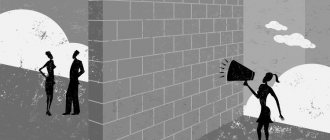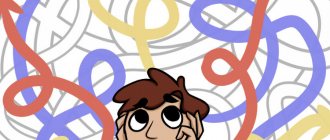“I can’t rely on anyone, so I do everything myself.” “I hate working for other people—that’s why I own my own business.” “Being part of the crowd is not for me.” Do these statements resonate with you? What character is behind them?
Vivian is not exactly the kind of person who can be described as “intimidated.” In fact, most of the time she appears to be quite fearless, making her own rules and living her life as she pleases. She is outspoken, confident and brave. She is always ready for adventure, loves to travel and cannot stay in one place for long.
Vivian works remotely in the information technology industry as an independent contractor. She really likes this format of work, because it allows her to carry out several projects at the same time. When a woman tried to work on the staff of one company for more than a year, everything did not go so well.
The thing is that Vivian is quite skeptical of most people. She admits that she has difficulty trusting others. She trusts only a few people in her life enough to consider them true friends.
However, Vivian is always upset when her colleagues go out for drinks after work or make plans for the weekend and she is not invited. The woman pretends that she doesn't care, but in reality she is very worried about it.
Tried to act like she didn't care
Vivian grew up the middle of three sisters and always felt like the black sheep of the family. Her two sisters were athletic and popular, adored by everyone, including her parents, while Vivian always felt like she didn't belong in their circle. She was more interested in the theater club, computers and art events, and all this was alien to Vivian’s family.
Although Vivian knew that her family cared about her, she never felt fully loved or accepted by them. Vivian always tried to act like she didn't care when in reality she was in a lot of pain.
In high school, Vivian gained a reputation as a black sheep. She figured that if people considered her a rebel, then she would be able to live up to her reputation. Vivian broke many boundaries and rules and came across as someone who was constantly in trouble for one reason or another.
After high school, she decided to travel for a year before going to college, and even now, years later, the woman realizes that it was one of the best decisions she ever made. For the first time in her life, she did not live in the shadow of her sisters.
Now that the sisters are older and have their own families, Vivian gets along well with them. Given her respectable job and impressive income, Vivian is no longer considered a troublemaker, but she still feels like she doesn't fit in with the family and therefore still doesn't let her sisters get too close.
Vivian is an Outcast.
Get rid of your "doomsday" mentality
All variations of fear, including fear of rejection, thrive when using “doomsday” thinking. In other words, our feelings convince us that an undesirable outcome will lead to the complete destruction of everything.
- What if they don't like me?
- What should I do if he/she rejects me?
- What should I do if I am not accepted to the party and I am left alone?
None of these situations will lead to the “end of the world,” but if we convince ourselves otherwise, we will become irrationally afraid of these outcomes and allow fear to win. The truth is that we human beings are extremely ineffective at making accurate predictions about our future. In fact, most of the time we studiously avoid conscious thinking, which in turn only reinforces our subconscious fears.
So ask yourself, “If disaster strikes and my fear of rejection comes true, what constructive ways can I fix it so I can move on and get on with my life?” Sit down and tell yourself a story (write it down afterwards if it helps) about how you will feel after the rejection, how you will allow yourself to be a little upset, and then how you will begin the recovery process by applying the experience. Doing this exercise will help you deal more easily with the fear of rejection.
People can't be trusted
The Outcast archetype is the quintessential rugged individualist. Such a person struggles most with the fear of rejection, or the fear of trusting other people. This fear is expressed in the attitude of “reject others before they reject you.”
Deep down, representatives of this archetype believe that people cannot be trusted, and they find confirmation of this in everything. Even if a person has neglected him out of absent-mindedness, the Outcast will be very sensitive to this, draw a conclusion, will not change his opinion and will reject the person forever.
Believing themselves unworthy of love and recognition, Outcasts are often desperate to “prove” something to the world, be it notable achievements, financial success, high social status, or extreme behavior.
Taken to extremes, the Outcast is sometimes capable of self-destructive or criminal behavior because people with this type of fear tend to see the world as conspiring against them and do not feel obligated to discern the undertones, and are also selfish and narcissistic.
It is difficult for outcasts to work in a team, it is difficult to ask for help and assistance. Sometimes these people lack tact and want to do things their own way, without the interference of others. Outcasts prefer to work independently.
Outcasts are the fourth most common fear archetype. In 15% of people it manifests itself as the main one, and in another 38% this archetype is in the top three.
Personality disorder and fear of rejection
At the psychopathological level, fear of rejection overlaps with many disorders but is of particular relevance to some personality disorders.
Borderline Personality Borderline personality disorder is characterized by pervasive emotional instability, impulsiveness in actions, and difficulty maintaining stable social relationships. These people react impulsively and emotionally to situations in which they anticipate or experience rejection. Those suffering from this disorder tend to feel more isolated from groups. They perceive less belonging even in the face of clear displays of acceptance and inclusion.
Narcissistic personality
A second disorder in which rejection sensitivity is central is narcissistic personality disorder. The experience of social rejection is very painful for these people, to the point of causing violent and angry reactions.
Avoidant personality
A third personality disorder that is based on fear of rejection is avoidant personality disorder. This pathology is characterized by a deep sense of inadequacy combined with a fear of criticism and rejection. These people tend to view themselves as chronically inferior to others, fearing most everyday interactions.
Social anxiety disorder
Finally, fear of rejection is central to social anxiety. This is not a personality disorder. It often manifests itself in a limited form due to the fear of being criticized during public speaking. Those who suffer from social anxiety are afraid of looking stupid and being criticized.
Positive qualities of an Outcast
Outcasts tend to be mobile, motivated, and determined to succeed in a particular endeavor. Even if a reward is not expected, they will be happy to express themselves in this way. Outcasts are often successful. Where most people would have given up long ago or given up hope of making a difference, the Outcast is persistent and willing to take risks.
The Outcast may not always be a great team player, but he is capable of being an excellent leader. An outcast, in principle, is not afraid of mistakes, uses any opportunities and knows how to take responsibility.
The Outcast is an individualist, he thinks critically and often has extraordinary opinions. These people tend to be attracted to careers that allow them to think outside the box, recognize their individual achievements, and promote recognition. They prefer to do everything on their own, to lead, rather than follow other people's instructions.
How does an Outcast behave?
- The outcast tends to believe that people will always suppress him;
- often afraid to let people get too close;
- prefers to “go deeper” into a conversation rather than laugh it off;
- expresses his opinion without fear of appearing stupid or boastful;
- often feels that he does not fit into society, does not fully belong to it;
- may be sensitive to any rejection, real or imagined, and often becomes overly or unreasonably resentful of someone who changes plans or does not include the Outcast;
- sometimes such a person lacks tact or empathy;
- An outcast can be selfish and narcissistic, everything should be the way he wants;
- it is difficult for him to cooperate with other people and conduct joint projects;
- is not afraid to take risks and try something new.
Ask yourself what "rejection" really means
If a person finds a 200-carat diamond, but due to ignorance he believes that it is a worthless item and throws it away, then who is “to blame” in this case: the diamond or the person? When one person rejects another, it exposes him more than the person he rejected. Very often we encounter the myopia and blinkered thinking of one person. Consider the following example:
If JK Rowling had stopped trying after being turned down by many publishers for years, there would be no Harry Potter. If Howard Schultz had given up after receiving more than 200 refusals from various banks, then it is unlikely that you would now be able to enjoy a cup of coffee in one of the Starbucks locations. If Walt Disney had given up on his idea of building a new amusement park after more than 300 rejections from various investors, you would never have been able to visit any Disneyland.
One thing is for sure: if you place too much importance on other people's opinions, you become their prisoner. So never let anyone's opinion change your reality. Never neglect yourself or who you want to be just because someone else has a problem with it. Love yourself for who you are inside and out and keep moving forward. No one can make you feel powerless unless you give that person power. And when someone turns you down, don't immediately assume that it's because you're unworthy or unattractive, because that only shows that they're being short-sighted.
How to learn to trust people more
If you are an Outcast, here are some strategies you can use to overcome your fear of rejection.
Rethink. Much of your fear comes from the script in your head. In this case, it is the belief that people cannot be trusted and it is better to reject others before they reject you.
If you want to overcome this fear, you must reformulate your attitude, create a new scenario in your head with different statements that you can repeat to yourself daily. Gradually, the new installation will replace the old one.
For example, if deep down you believe that people cannot be trusted, start telling yourself, “Just because someone has hurt me in the past does not mean that all people are untrustworthy. There are a lot of people in my life that I can trust.”
If you are afraid that people will reject you or let you down, you can reframe this scenario by telling yourself, “Just because someone tells me that they disagree with my opinion does not mean that they are rejecting me as a person.”
Take action. In addition to rewriting the script that is currently playing out in your head, you also need to take some steps to trust and cooperate with other people in real life situations. This will help you confirm and reinforce your new beliefs.
Try to be more proactive in situations that you usually shy away from. For example, if you usually prefer to go it alone and seem to get by on your own, then ask for help or join a group of people. If your trust issues are severe, then it is better to go to a specialist to explore the possible roots of your fear.
Create accountability. As an Outcast, you don't want to allow yourself to be vulnerable. That's why it's so important to actively try to open up about yourself—even if only to one or two trusted people with whom you share responsibility.
Most likely, you will feel completely unnatural at first. Regardless, seeking accountability and honest feedback is critical to overcoming fear. Your accountability partner will help you identify times when your inner Outcast is putting up a defense and will provide support in overcoming your fear of rejection.
You need to trust your partner as much as possible and let him guide you. Since you are not accustomed to seeking help from others, this type of trust may be especially difficult for your archetype.
Advertising
Understand the reasons
A great way to overcome the fear of “no” is to ask those who answer negatively about the reasons for their decision. This will allow, on the one hand, to accumulate experience, which will allow us to evaluate the chances of “winning” in the future. And at the same time it will give you the opportunity for a “second pass”. After all, a person talking about the reasons for saying “no” is able to revise his own initial conclusions in the process of explanation.
Naturally, the question must be asked correctly and gently, so as not to provoke the respondent to aggression.











